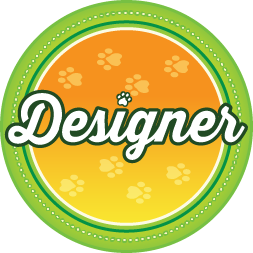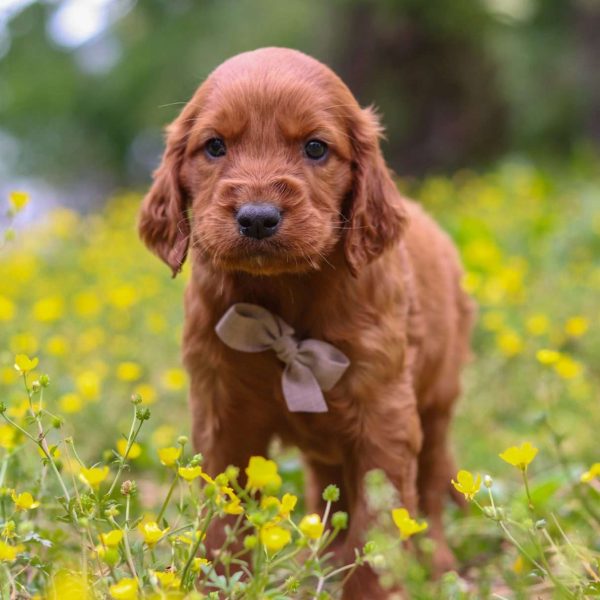
-
Activity Level:
high
-
Shedding Level:
moderate
-
Grooming Level:
moderate
-
Trainability:
high
-
Good for Novice Owners:
high
-
Adaptability:
moderate
-
Kid/Pet Friendly:
often
-
Prey Drive:
high
-
Watchdog:
chill
- Average Size: Medium
- Average Lifespan: 10-15 years
- Registered?: other
Golden Irish Dog Breed Information
Overview
Temperament
Adaptability
Health
Owner Experience
Grooming
Activity Level
Size
Life Span
Did You Know?
A Golden Irish is a designer dog breed that is a cross between a Golden Retriever and an Irish Setter. Although a mixed-breed dog can take on any combination of characteristics from either or both parents, a Golden Irish tends to be a friendly, social, affectionate, and energetic dog that loves spending time with their families.
Although the Golden Irish is not recognized by the American Kennel Club, they are recognized by other notable canine organizations. The Designer Breed Registry, Dog Registry of America, Designer Dogs Kennel Club, American Canine Hybrid Club, and more all recognize the Golden Irish.
Golden Irish are great for single owners and for families. They are loyal to their favorite humans and also love to meet new people. Because they are friendly, playful, and love attention, they tend to get along well with children and tend to make great playmates for them.
They also tend to get along well with other dogs, but can have a high prey drive. As long as they have been socialized well with smaller pets in the household, they tend to be fine. But, they may still chase them from time to time. Golden Irish also tend to be open and friendly with strangers as long as they are properly socialized and trained.
A Golden Irish is a moderately adaptable dog breed. Their high energy and urge to chase makes them a better fit for larger homes with fenced-in yards where they can run. But, as long as you dedicate plenty of time every day to giving them the exercise and mental stimulation they need, they can adapt to living in an apartment or a home without a yard.
They tend to do well in most climates. As with any dog breed, they are sensitive to heat. They do relatively well in the cold. But, depending on how harsh the winter is, you may need some winter dog products to help protect their paws and keep them warm while out on walks. Because they thrive on attention, they should not be left alone for long periods of time.
Are mixed-breed dogs healthier than purebred dogs? They can be sometimes, but it’s not a guarantee. Just as mixed-breed dogs can take any combination of traits from their parents, the same is true for health conditions common to the parent breeds. They could inherit a mix, all from one, all from both, or none.
For the Golden Irish, potential health conditions to be aware of include hip dysplasia, elbow dysplasia, hypothyroidism, progressive retinal atrophy, epilepsy, skin issues, and Von Willebrand’s disease. They can also be prone to developing allergies. As a barrel-chested breed, they are also at risk for bloat. Bloat in dogs can become dangerous quickly, so it’s important to know how to reduce the risk and the signs so you can get help immediately.
Reputable breeders will screen their dogs to avoid passing preventable issues on to puppies. So, make sure you ask about the health and genetic history of both of the parent breeds. You can also ask about any available health clearances or test results.
The Golden Irish is a highly intelligent dog breed. They are eager to please and pick up on things quickly. But, they can become bored easily and may inherit a little bit of an independent streak from their Irish Setter parent.
In general, these dogs are a good fit for owners of any experience level. If you find yourself with an independently-minded Golden Irish or their energetic personality offers a challenge, you can always enroll in puppy training classes to help you manage it.
Puppy training classes tend to be a good idea regardless of whether you actually need them. Not only do they strengthen the bond you have with your puppy, but they also often offer opportunities to socialize a puppy. Plus, your Golden Irish will love the chance to make new friends.
A Golden Irish tends to have a long, silky coat that sheds moderately year-round. They’ll need daily brushing to remove loose fur and tangles, and to prevent mats from forming. Bathing is on an as-needed basis.
In addition to coat care, you will also need to care for your Golden Irish’s nails, ears, and teeth. Cutting your dog’s nails once or twice monthly is usually enough to keep them from growing too long. Checking ears and carefully cleaning your dog’s ears as needed can help prevent ear infections.
Ideal dental care for dogs starts with brushing teeth or using an enzyme toothpaste every day. This can help prevent painful dental diseases, like gum disease, tooth decay, and tooth loss, later in life. Vet-approved dental hygiene chews and a dental care diet formulated for your dog can help supplement your efforts.
The Golden Irish is a high-energy dog breed that requires a lot of daily activity to be happy and healthy. Daily walks plus some playtime and time to run are usually enough for this dog. But, they will also likely be up for more activity if you are.
These dogs also tend to be versatile and athletic. So, once puppies finish growing, you can try a bunch of different activities to see what you and your dog like best. They tend to love trips to the dog park. Swimming, running, playing frisbee or fetch, hiking, training for dog sports, and more can all be great activities to try once your Golden Irish has finished growing and developing.
A fully-grown Golden Irish usually stands 21-28 inches tall and weighs 55-80 pounds.
A Golden Irish generally lives for 10-15 years.
Although this dog breed is more commonly called a Golden Irish, they are also sometimes called a Golden Irish Setter or a Golden Retriever/Irish Setter Mix.





